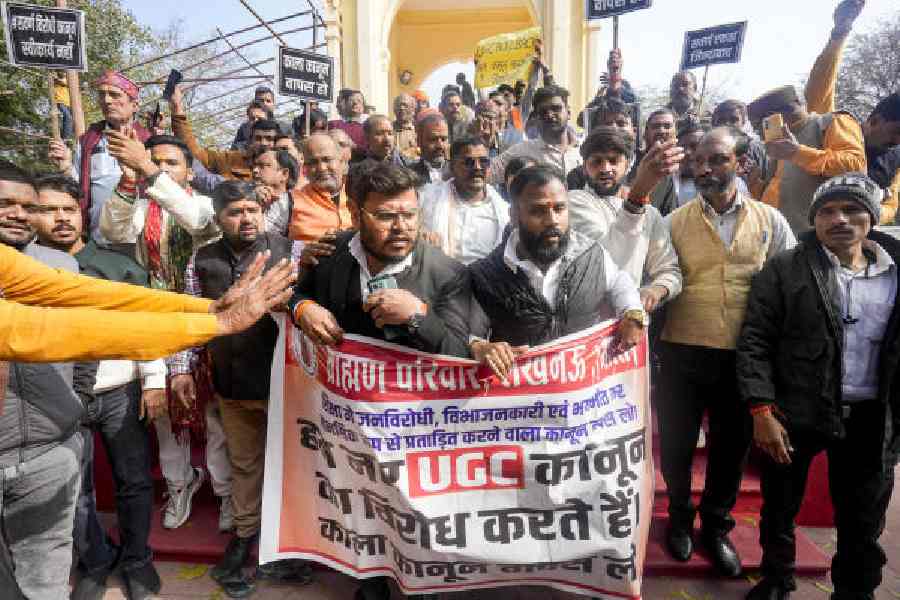Exactly this time last year, Amrita Sanyal found herself staring at the ugly face of uninvited sex talk. Sanyal, who worked in a television channel, had just resigned to take care of her ailing father. While she was serving her notice period, her boss buttonholed her one day. Did she have many men in her life, he asked.
'His body language was suggestive, vulgar to say the least. I was completely shaken and didn't know what to do. I went home and wrote a Facebook post on the incident without naming him,' she says.
A slew of reactions followed, mostly urging her not to take it too seriously. The editor's wife told Sanyal she was 'creating' an issue out of nothing. A day after her post, her office administration told her she was being relieved from that very day. Meanwhile, the editor — who had earlier been fired from the same organisation for groping a woman and then reinstated — continues to hold his job.
Now, a year later, a young journalist from Tehelka has triggered a quake. Earlier this week, the reporter accused editor-in-chief Tarun Tejpal of sexually molesting her twice in a lift in a Goa hotel. She sent a letter to her boss, and within hours, it went viral. It sparked widespread support for her on the social media; it prompted Tejpal to tender an apology and step down; it pushed the magazine to set up a committee to probe the allegations; and it led the Goa police to frame charges of rape against Tejpal.
A year ago, nobody really cared about Sanyal. Today, the Tehelka journalist has all the support she needs. So what happened in between to bring about this radical change?
It was the rape — and subsequent death — of a young physiotherapist. On December 16, 2012, the young woman was brutally raped and assaulted in a moving bus. It evoked a groundswell of support for her, and condemnation for the criminals. Thousands and thousands of women came out on the streets that winter. The protests led to the formulation of a new law based on the recommendations of the Justice J.S. Verma committee, set up after the incident, which redefined rape and spelled out stringent punishment for the act.
'People have been angry for a long time, but it is only now, after December 16, that they are voicing their anger,' Nivedita Menon, professor at the Jawaharlal Nehru University, Delhi, stresses. 'There is a heightened awareness of sexual violence and women are willing to come forward and raise their voices.'
The year 2013 will possibly be remembered as a watershed year of such voices against sexual harassment (SH) at the workplace. Just days before the Tehelka reporter's letter, a blog written by a law graduate kicked up a furore. In her blog, the woman accused a retired Supreme Court judge — old enough to be her grandfather, she said — of sexually harassing her when she was an intern in his office. Her allegations forced the apex court to institute a committee to probe the charges and there have been demands that the judge be named.
Soon after that, Mihira Sood, a 29-year-old lawyer now studying at the Columbia Law School, blogged about the advances made by a senior lawyer, whom she assisted. 'The advances were not physical; more in the nature of an obsessive romantic and sexual interest, starting with inappropriately timed phone calls to flowers, dinner invitations, and then sexually explicit email forwards and SMS jokes to more explicit expressions. This wasn't courtship, it was pursuit by a man old enough to be my father, who knew perfectly well how difficult it would be for me to reject him,' she wrote.
Sood rues that she didn't make the matter public when it happened some years ago. 'I wish I'd had the courage to report it then, but I don't know what it would have achieved,' she tells The Telegraph.
But the reporter, one of her friends asserts, felt she couldn't keep quiet. 'She has been reporting on sexual crimes. So she thought that it would be wrong not to speak up when it has happened to her,' the colleague states.
There was a time when it was thought that the Supreme Court's landmark judgement known as the Vishaka verdict would control harassment at the work place. The court's guidelines on what constitutes harassment — innuendos, remarks, jokes, inappropriate touches and so on — were spelled out, and every organisation with 10 or more employees was directed to set up a committee (with an outside member) to look into such cases.
Few complied.
'No doubt it was a landmark judgement in providing a legal framework for addressing the issue and getting justice. But even after that, in terms of social and cultural attitudes, it was still a really difficult task for a woman to get anywhere with such an issue. Putting up with it seemed easier than fighting it out,' Mumbai sociologist Kamala Ganesh holds.
In the legal world, too, harassment continues unabated. 'Every woman in the judiciary at all levels — starting from clerk to intern to litigant to lawyer — faces sexual harassment at some point of time. This is an open secret but nobody talks about it,' Supreme Court lawyer Vrinda Grover stresses.
Take the case of a female lawyer who was arguing with a male lawyer in a Delhi court. In the midst of the heated argument, he suddenly brushed against her breasts. 'How dare you,' she yelled. 'I can do it again,' he said — and did so.
Not surprisingly, Rukmini Sen, assistant professor of sociology, Ambedkar University, Delhi, maintains that the Vishaka guidelines have done little to combat harassment. 'It's nothing but a piece of paper,' she says, pointing out that even the Supreme Court didn't follow the guidelines until recently. Indeed, it was only in July that the court finally framed regulations to protect women lawyers from sexual harassment within the court complex, including inside chambers in the apex court's precincts.
Elsewhere, the situation is equally bad. Take the case of Shirley, a young secretary working for an oil company in Mumbai. Her boss, a noted lothario who often harassed her, once even visited her house to ask her father for permission to take her out. He then leered at Shirley's mother, who squirmed with nervousness. A month later, Shirley was given the sack.
In the Information Technology (IT) sector, such cases come up regularly. About 88 per cent of women working in the sector have been victims of some form of sexual harassment in office, says a 2011 survey of 2,000 women IT professionals interviewed by the Centre of Transforming India (CTI), a Delhi-based think-tank. About 50 per cent of the respondents said they were verbally abused and sexual favours were demanded. Ninety-one per cent said they did not report the harassment for fear of being victimised.
'In 72 per cent of the incidents, the perpetrator was a senior company executive,' Pankaj Sharma, chief trustee, CTI, told The Telegraph earlier this year.
Supriti (she doesn't use a second name), a Bangalore-based diversity and inclusion consultant and former chairperson of the Grievance Redressal Body for sexual harassment complaints at Infosys Technologies, however, stresses that IT companies were one of the first to take sexual harassment in workplaces seriously.
'Changes are happening (in the IT sector) because there is increasing awareness about sexual rights among urban women.
The new generation is clear about their rights. Laws are being passed to ensure harassment-free workplaces. Multinationals are coming in and they are introducing global SH policies,' says Nirmala Menon, founder of Interweave Consultancy, Bangalore.
Often, they are also pressured to do so by the foreign companies they are in tie-ups with.
Nivedita Menon, however, maintains that except for universities, most institutions have failed to implement the Vishaka guidelines. 'Governments, NGOs, major companies, you name an institution and it has failed,' she says.
Not that the world of academia is any better. She herself recalls in Kafila.org, a website on social and political issues, a list of men who harassed women students or colleagues. A professor in his 60s wrote love poetry to an MA student; a male teacher hugged a woman academic who only wanted to shake hands (he also kissed her forehead); another male teacher told a woman student who came late to class to be punctual. 'It distracts me when you enter late. You shouldn't be so beautiful,' he said.
Harassment, as the Sanyal case highlights, is not just about physical touch. Shashikala Gurpur, dean at the Symbiosis Law School, Pune, recalls the case of a woman official in a semi-government chocolate making company in Mangalore who was the butt of cruel jokes by her male colleagues. The men described her body as 'flat as a playground'.
Parul Tank, consultant psychiatrist at Fortis Hospital, Mumbai, cites the case of an executive's senior manager who would always talk about his personal and sexual life with her. 'He would pass lewd remarks and crack dirty jokes, which made her uncomfortable,' Tank says. The executive finally took the matter to the women's cell in her office. The manager was reprimanded and transferred to another department.
Nirmala Menon holds that SH is now openly discussed in mixed groups and comes up in drawing room conversations. 'This was not the case a few years ago,' she says. Today, more and more women are joining the workforce — in Hyderabad alone the number of women workers has gone up threefold in the last 10 years, according to census figures. And many don't hesitate to take on men who harass them in offices and elsewhere.
That's because the stigma of sexual harassment is fading. And one of the reasons, says Gurpur, is the death of the brave physiotherapist who tried her best to live.
'She is a martyr — she raked up the conscience in girls,' Gurpur says. 'The horrible things that happened to her touched a chord in every woman and girl in the country. They are not willing to tolerate violence anymore,' she says.
As women raise their voices, steps are being taken. The Symbiosis Law School, Pune, saw a recent case of a 19-year-old male student who tried to hug and kiss a girl in the college library. 'He was removed instantly,' says Gurpur. 'Immediate action needs to be taken in these cases. The aggressor and the victim cannot be under the same roof after the incident.'
Social media platforms also make it difficult for people to keep SH cases under wraps. 'Of course, while there are many topics that trend on Twitter and nobody cares about them, the Internet has definitely provided a platform for people to voice their concerns,' says Sunil Abraham, executive director, Centre for Internet and Society, Bangalore.
But the experts hold that such cases will continue unless sexual harassment committees are instituted and taken seriously by offices. Workshops and seminars are important too. Nirmala Menon cites the case of a woman at an IT company in Bangalore who, after attending one such workshop, put her foot down when her project manager cracked dirty jokes and sent her personal messages and emails. The experts also believe that gender education should be made compulsory in schools to sensitise the young.
And, equally important, they assert that it's time men changed. 'They still see a yes in a no,' rues Saswati Ghosh, a women's right activist and head of the department of economics, City College, Calcutta.
Postscript: The day after the Tehelka controversy erupted, Amrita Sanyal got a letter from her former office. 'For the first time, I got a proper reply from the HR (human resources department) head of the organisation. It seems that the Tehelka incident made them take my case more seriously.'
(Names of some people have been changed to protect their identities)
Bollywood's Bane
2011: Payal Rohatgi accused director Dibakar Banerjee of inappropriate behaviour during the filming of Shanghai. Her allegation was brushed aside.
2009: Shiney Ahuja arrested after his maid accused him of raping her. The scandal finished his career.
2005: Television actor Aman Verma fell for a casting couch sting operation by India TV.
2004: Preeti Jain accused director Madhur Bhandarkar of raping her. Supreme Court quashes the charge against him in 2012.
1998: Mamta Kulkarni accused director Raj Kumar Santoshi of demanding sexual favours during the filming of China Gate. Kulkarni's career fizzled out
1986: Sabeeha, daughter of yesteryear actress Ameeta, accused Rajesh Khanna of lewd conduct during the filming of Anokha Rishta. Nothing came of the allegations.
One step forward, one step back
(A few landmark cases of sexual harassment)
1994 Doordar-shan's M. Sailaja Suman filed a sexual harassment case against the organisation's director P.L. Chawla. She was transferred to Lucknow and at present is the director of Doordarshan Kendra, Hyderabad. On record she has said she no longer harbours any hard feelings.
1996 Former cop K.P.S. Gill was found guilty of outraging the modesty of Rupan Deol Bajaj, an IAS officer, by a trial court. She had complained in 1988 that Gill had made sexual advances at her at a party. The conviction was upheld in the Supreme Court in 2005, but he did not serve any jail time.
2000 A young practising lawyer, Sangeeta Sharma, committed suicide and according to reports her suicide note directly held three lawyers responsible for her death.
2013 In August, Asaram Bapu, a spiritual leader, was charged with sexual assault of a minor girl, the daughter of one of his devotees, in his ashram. He has been in jail since then.
2013 In May, IT outsourcing company iGate Corp sacked its chief executive Phaneesh Murthy for not disclosing a relationship with a subordinate.
2013 In September, Pavitra Bhardwaj died after setting herself on fire in Delhi. The sacked employee of a Delhi University college had alleged sexual harassment by its principal.
Flirting or hurting?
(Highlights of a survey on workplace behaviour conducted on 385 respondents in Delhi, Mumbai, Bangalore and Pune in November 2012 — a month before a young physiotherapist in Delhi was raped and killed)
Sending provocative sms to a colleague of opposite gender
17%
says it's sexual harassment
44%
says it's flirtation
Asking for sexual favours from a colleague with promise of promotion
54%
says it's sexual harassment
8%
says it's flirtation
Complimenting a colleague on his/her looks
18%
says it's sexual harassment
44%
says it's flirtation
Cracking vulgar jokes in front of a colleague of opposite gender
23%
says it's sexual harassment
25%
says it's flirtation
Use of foul/explicit language in front of a colleague of opposite gender
23%
says it's sexual harassment
27%
says it's flirtation














